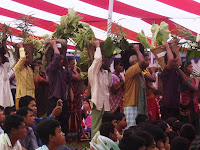
The Wangala Harvest Feast is celebrated by the Abeng Garos in Madhupur and in many places in India and is distinctive to the Abeng Garos. This Feast ushers in the most beautiful time of the year. and generally occurs in October when the “jhum” or hill rice is harvested. The rains peter out and the weather becomes sparkling and clear. There is little rain and crops can be harvested. Some time after Wangala there is some cultivation in the “jhum” or slash and burn fields. These fields are cultivated for three years and trees planted after that. Preparation for Wangala begins well before the celebrations are due. Cows or pigs must be purchase from the market to provide meat for the feast. Many people buy new clothes in order to be elegant for the celebration, and men usually repair their houses. The day before the celebration and dances, the cows or pigs are slaughtered.
Dances are practiced and the sound of the “aduri” or horn and drums are heard day and night. The many beautiful dances imitating planting of rice and the death mourning and cremation are practiced. The chicken marriage is imitated along with the slaughtering of animals and the death rites sending the soul for reincarnation to Nokrek, Balpakra and Chickmang hills in India. After cremation the area is smoothed and reincarnation is divined by whatever walks across the soft clay in the next morning.
Wangala is one of the three feasts celebrated by the Abeng and imitate daily activities. Capturing the boy, the cremation, harvesting the hill rice, clearing the jungle for the hill rice, reincarnation are all imitated thru dances. A free flow of rice wine makes for free dances and lot of fun and horseplay that are out of place ordinarily. gongs, flutes and trumpets are played and songs imitating Garo life are sung.
A
 t the Wangala, it is the custom to mix flour with water and put a mark with the mixture in the shape of
t the Wangala, it is the custom to mix flour with water and put a mark with the mixture in the shape of
the chicken foot on the forehead symbolizing the resurrection. The Harvest Feast is a time for
rejoicing and celebrated with dances, songs and family reunion by the Abengs. The Madhupur
Garos celebrate Mangals and thank God for their beautiful children and family life. Cultural values of family, culture, religion, honesty, truthfulness and inner peace and joy are still valued and practiced in Bangladesh.The Mandis in Pirgacha Mission are still close to their cultural values of family love for the child and spouses. Family life is blessed by their Catholic faith and our Mandis are now educated and hard working. May God Almighty bless all who celebrate this beautiful Wangala Feast. Let us also be thankful for all our benefactors and teachers. Jisuna Rasong!
Rev. Eugene E. Homrich,CSC
Parish Priest, St. Paul's Church,
Pirgacha, Madhupur, Tangail, Bangladesh.
Rev. Eugene E. Homrich,CSC
Parish Priest, St. Paul's Church,
Pirgacha, Madhupur, Tangail, Bangladesh.


No comments:
Post a Comment